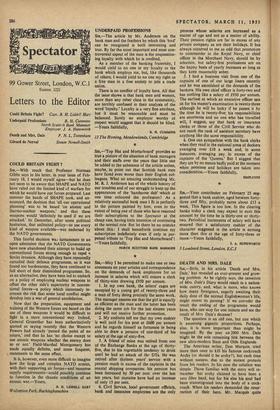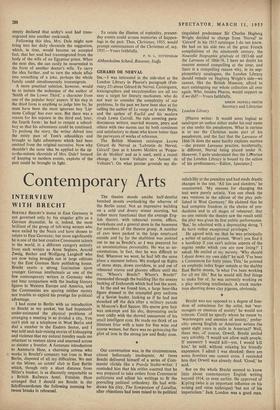DEATH AND MRS. DALE
SIR,—Strix, in his article 'Death and Mrs. Dale,' has revealed an ever-present and grow-
ing problem As he rightly says, the cessation
of Mrs. Dale's Diary would result in a nation- wide outcry, and, what is more, who knows how many foreigners, eagerly awaiting their daily dose of the normal Englishwoman's life, might resent its passing? If we consider the result the ending of the programme would have, who can stop for one minute and see the result of Mrs Dale's decease?
The question is an old one, but one which is assuming gigantic proportions. Perhaps, also, it is more important than might be imagined. By the year AD 2000 Mrs. Dale might be the sole remaining link between the new ultra-modern State and Olde Englande.
The American writer, Don Marquis, tried more than once to kill his famous cockroach Archy (or should it be archy'?), but each time without success, due to the instant protests from his readers. In his case the solution was simple. Those familiar with the story will re- member hat archy claimed to have been a yers fibre bard, but for his sins his soul had been transmigrated into the body of a cock- roach When his readers demanded the resur- rection of their hero, Mr. Marquis quite
simply declared that archy's soul had trans- migrated into another cockroach.
Following this idea, Mrs. Dale might now bring into her daily chronicle the suggestion, which, in time, would become an accepted fact, that her soul had transmigrated from the body of the wife of an Egyptian priest. When she next dies, she can easily be resurrected in the form of another doctor's wife. To carry the idea further, and to turn the whole affair into something of a joke, perhaps the whole family could simultaneously transmigrate.
A more practical solution, however, would be to imitate the technique of the author of 'Smith of the Lower Third,' a character from one of the popular boys' papers. If his stay in the third form is anything to judge him by, he must have been the most ignorant boy 'Lip- stone College' has ever seen. But there was a reason for his sojourn in the third and, later. the fourth form: he had to remain a school- boy so that his adventures could be continued. To prolong the story, the writer delved into the misty past of Tom's schooldays and brought to light adventures which had been omitted from the original narrative. Now why shouldn't the same idea be applied to the up- to-the-minute chronicle of Mrs. Dale? Instead of keeping to modern events, exploits of the past could be brought to light. To retain the illusion of topicality, present- day events could arouse memories of happen- ings in the past. Thus. Christmas, 1955. would prompt reminiscences of the Christmas of, say, 1935.—Yours faithfully.
P. N. L. TOTTENHAM
A bbotsholme School, Rocester, Staffs











































 Previous page
Previous page